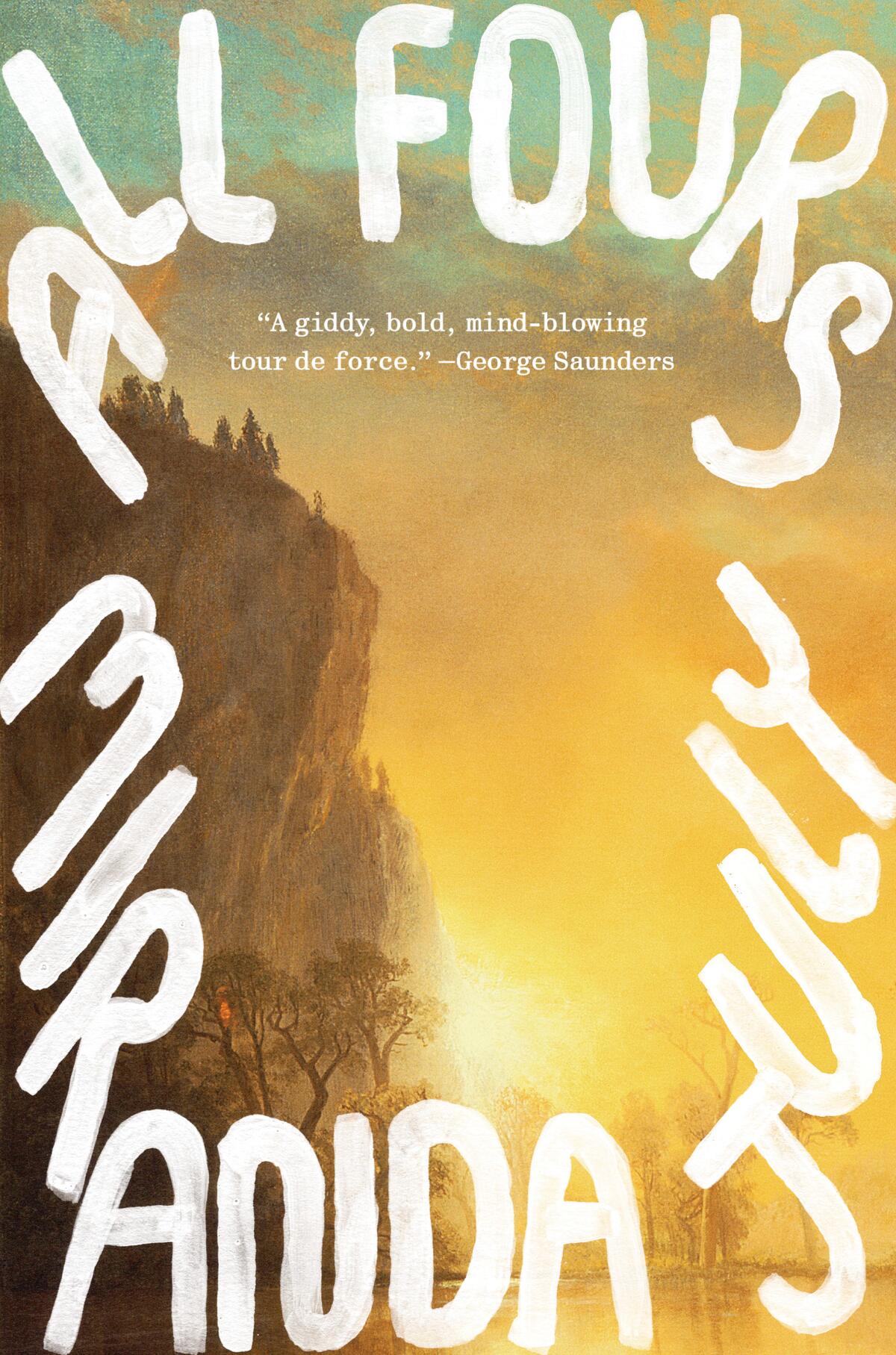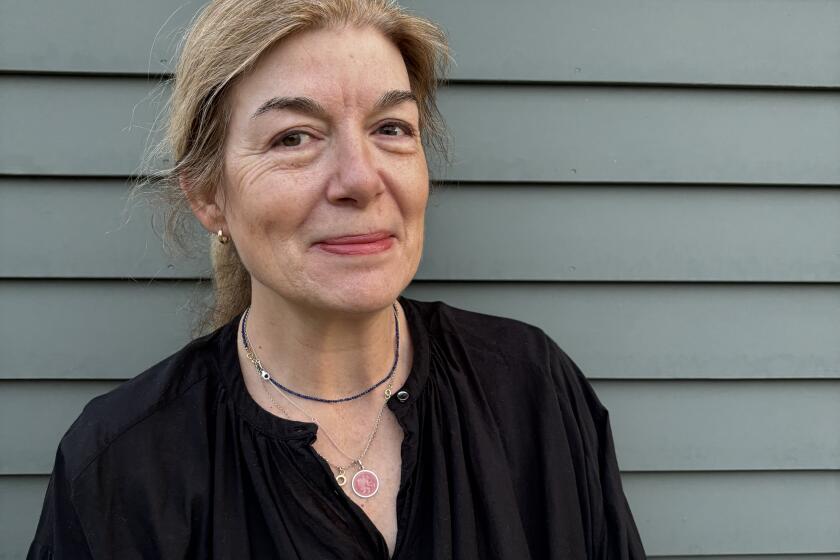At last, a midlife-crisis novel that’s not about a man

- Share via
Book Review
All Fours
By Miranda July
Riverhead: 336 pages, $29
If you buy books linked on our site, The Times may earn a commission from Bookshop.org, whose fees support independent bookstores.
Many of the past century’s “great” novels have taken as their subjects middle-aged men who wake up one morning to discover that their boring, midlevel management jobs, their mediocre children and their aging wives are bumming them out, man. In the mid to late 20th century, literary lions such as Saul Bellow, John Updike and Philip Roth wrote fat novels about domestic life and American masculinity, and critics lauded them for their “universal” themes of upper- and middle-class men straining against the shackles of duty while undergoing midlife crises.
Now it’s American women’s turn. Miranda July’s novel about an unnamed Los Angeles woman’s reckoning with midlife brims with vivaciousness. It’s a novel that imagines the end of fecundity as joyful. “All Fours” envisions perimenopause as a second flowering.

The 40-something white protagonist, an affluent artist whose work across genres brought her early fame, contemplates the life she and her husband have made with their child. The wheels are set in motion when, at a cocktail party, her husband muses that there are two kinds of people, parkers and drivers: “Drivers are able to maintain awareness and engagement even when life is boring. They don’t need applause for every little thing. … Parkers … need a discrete task that seems impossible, something that takes every bit of focus for which they might receive applause. … The rest of the time they’re bored and fundamentally kind of … disappointed.”
The epic, the intimate and the autobiographical meet in Claire Messud’s latest novel, ‘This Strange Eventful History’
Stung by his criticism — “what he called disappointed was really just depressed” — she decides that rather than flying to upcoming engagements in New York, she will instead set off on a cross-country journey, returning to her family in just under three weeks. Determined to “maintain awareness and engagement,” in the car she finds it impossible to get out of her own head. Unable to find anything of interest on the road, she doesn’t travel far before she stops for lunch and ends up checking into a cheap motel.
What results is a deliciously bawdy, emotionally rich novel about the whirligig that results when the physical and emotional upheavals of middle life collide.
In her debut novel, J. Nicole Jones draws from our chaotic reality to create a dystopia where a woman awaits judgment for refusing to conform.
Surprised at her own choice to stay in the motel, the narrator considers going back home. “This was the thinking that had kept every woman from her greatness,” she thinks. “There did not have to be an answer to the question why; everything important started out mysterious and this mystery was like a great sea you had to be brave enough to cross. … You had to withstand a profound sense of wrongness … my more seasoned parts just had to be patient, hold their tongues — their many and sharp tongues — and give the new girl a chance.”
At first, she sees the time as an opportunity to start a new creative project but feels stymied in the dingy motel room. She has it redecorated, but still inspiration for work does not strike. Instead she finds herself seeking escape from the long twilight of her emotions, a life stripped of color that has become a continuous cycle of gritting her way through waves of panic and depression. In her now-luxurious cave, she can reckon with continuing grief from her child’s tragic and traumatic birth, her blocked creative work and her marriage.
She initially thinks an affair will bring new life, and she indulges a crush on a local man she has met. Her new room, with its richly colored walls and soft furnishings, serves as a metonym for this reconnection to her physical self.
A friend challenges her as she spins out her fantasies of romance with this man, Davy. “What happens after that? … Take Wile E. Coyote and the Road Runner. If he gets the bird, then who is he? What’s the cartoon about?” Thus July realistically explores any magical resolution offered by any love interest. To choose Davy would mean giving up her marriage, and more importantly, her child. Motherlove — the rush of emotions the artist feels when thinking about her child — reminds her that she cannot simply abandon her old life in pursuit of something new.
The thwarted Odysseus returns home to her unsatisfying domestic life. Complicating matters is the news that she is entering perimenopause, ending her “childbearing years.” Convinced that this signals the end of all desire, she focuses on enjoying desire while she still has it. Her insistent libido finds no release in her husband; instead, she fantasizes about Davy. She joins a gym, determined to create a body that Davy will enjoy. She longs to hold the male gaze.
She reaches out to other women, talking to them about sexual desire and their experiences with fertility, hysterectomy, menopause. How can marriage, contracted when young, accommodate the ways that partners change and grow? Each of her friends’ stories, in intimate and ribald detail, offer companionship in a phase of female life often experienced alone and with few resources. Reading such details in a literary novel was thrilling.
What if a woman’s midlife crisis is not a tale of decline? What if women’s 40s are about moving into a new cycle, one in which the constant governor of reproductive concerns is removed. What then?
Miranda July queers these questions with a profound and earthy frankness, approaching them from the perspective of her privileged, white narrator. But July’s book opens up the possibilities for other women to tell these stories with a multitude of voices, exploring what it means for a woman to fully inhabit her middle-aged body.
May a thousand flowers bloom.
Lorraine Berry is a writer and critic in Eugene, Ore. @BerryFLW
More to Read
A cure for the common opinion
Get thought-provoking perspectives with our weekly newsletter.
You may occasionally receive promotional content from the Los Angeles Times.












